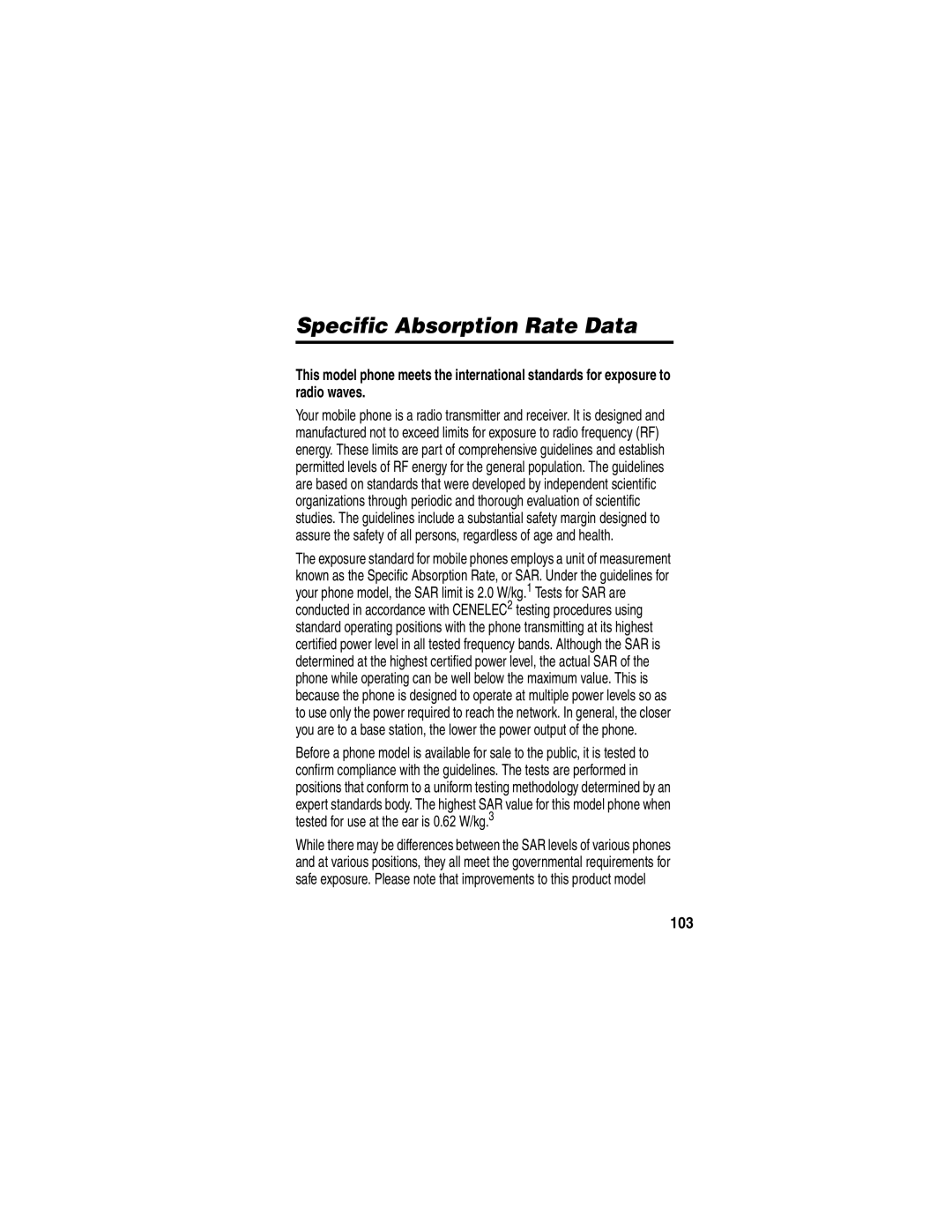Menu Key
Accessory
Welcome
Smart Key Voice Key
Check It Out
Send
Wireless
Set Photo as
Picture ID
Motorola, Inc
Contents
Page
Page
External Antenna Care
Safety and General Information
Data Operation
Approved Accessories
Phone Operation
Body-Worn Operation
Aircraft
Facilities
Medical Devices
Potentially Explosive Atmospheres
For Vehicles With an Air Bag
Batteries
Blasting Caps and Areas
Chargers
Repetitive Motion Injuries
France Only
European Union Directives Conformance Statement
About This Guide
Getting Started
Or contact the Motorola Customer Call Center at
Provider for more information
Selecting a Menu Feature
Optional Features
Optional Accessories
Battery Use
Installing the SIM Card
To maximize your battery’s performance
Getting Started
Charging the Battery
Installing the Battery
Action
Charger or phone accessory
Turning Your Phone Off
Turning Your Phone On
Keypad keys Dial the phone number Make the call
Adjusting Volume
Making a Call
You must be in the home screen to dial a phone number see
Viewing Your Phone Number
Answering a Call
Nor Answer the call
Find the Feature M Multimedia Camera
Highlight Features
Taking and Sending a Photo
Taking a Self-Portrait
Stored on your phone
Adjusting Camera Settings
Open the setup menu to
View pictures and photos
Sending a Multimedia Message
Find the Feature
Highlight the file you want
Scroll to Insert
Insert
Select the file type
Highlight an existing
When you finish composing the multimedia message
Store the message
Scroll to a Send To option
Scroll to Receipt to request a
Store the subject
Select Attachments to attach a
Attach the file
Turning Bluetooth On or Off
Using a Bluetooth Wireless Connection
Searching for Other Devices
Sending a Picture, Sound, or Video
Sending Objects to Another Device
Sending a Phonebook Entry, Datebook Event, or Bookmark
Learning to Use Your Phone
Using the Display
Learning to Use Your Phone
CSD call
Signal Battery Strength
Level
= secure packet
Context active
= Gprs packet
Call forward on
Message
= voicemail
= voicemail = IM message Text message = active chat
Using the Operator Key
Using the 4-Way Navigation Key
Using the Message Key
Right Soft Key Left Soft Key
Using Menus
End Key
Selecting a Feature Option
Entering Text
Selecting a Text Entry Mode
Using Capitalization
Setting Primary and Secondary Text Entry Modes
Text Entry Mode Indicators
Letter Display Sleft or right
Using iTAP Mode
Entering Words in iTAP Mode
Keypad keys Show possible letter One press per
Sup
Another
Entering Novel Words in iTAP Mode
Press Press Sright
To highlight
Entering Numbers and Punctuation in iTAP Mode
Tap Mode Text Entry Rules
Using Tap Mode
This is the basic text entry mode on your phone
Entering Words in Tap Mode
Character Chart
Symbol Display
Using Numeric Mode
Using Symbol Mode
Keypad keys Show possible symbol One press per
Enter the highlighted
Symbol Chart
Next action you are likely to
Using the Smart Key
Deleting Letters and Words
Smart key gives you another
Returning an Unanswered Call
Using the External Display
Setting Phone Ring Style
Volume keys
Press the smart key to exit without calling
Using the Handsfree Speaker
Locking and Unlocking Your Phone
Changing a Code, PIN, or Password
Unlocking Your Phone
Setting Your Phone to Lock Automatically
Find the Feature M Settings Security
Locking Your Phone Manually
Using the Phonebook
If You Forget a Code, PIN, or Password
Voice Dialing a Number
Storing a Phone Number
Recording a Voice Name
Dialing a Number
Viewing Entries By Category
Setting a Picture ID for a Phonebook Entry
Setting Picture ID View
Sorting Phonebook Entries
Setting a Ring Style
Setting Up Your Phone
You can set the following ring styles on your phone
Changing the Call Alert
Setting the Time and Date
Setting a Wallpaper Image
Setting a Screen Saver Image
Downloading a Theme
Setting a Phone Theme
Find the Feature M Multimedia Themes
Changing Phone Skin
Deleting a Theme
Setting Answer Options
Adjusting the Backlight
Setting Display Brightness
Setting Display Timeout
Storing Your Name and Phone Number
Viewing Recent Calls
Calling Features
For basic instructions on how to make and answer calls, see
Turning Off a Call Alert
Call the entry’s number
Perform other procedures
Scroll to an entry
Connected
Redial the number
Using Automatic Redial
Redialing a Number
View the dialed calls list
Make the call
Using the Notepad
Returning an Unanswered Call
Select a call to return
Putting a Call On Hold or Mute
Using Call Waiting
Connect the 2 calls
Using Caller ID Incoming Calls
Switch between calls
Answer the new call
Dialing International Numbers
Calling an Emergency Number
Calling With 1-Touch Dial
Listening to Voicemail Messages
Using Voicemail
Select the location
Keypad keys Enter your voicemail number
Receiving a Voicemail Message
Storing Your Voicemail Number
Listen to the message
Changing the Active Line
Main Menu
Phone Features
Personalize Phone Status
Settings Menu
Calling Features
Feature Quick Reference
TTY Calls
Messages
Forwarding
Call Barring
Phonebook
Set Picture
Voice Dial
Set Ringer
ID for Entry
Sort
Set
Category
View
Personalizing Features
Show or
Clock View
Menu View
Main Menu
Instant Messaging
Chat
Menu Features
Clear
Special Dialing Features
Reset
Master
Quick Dial
Service
Call Monitoring
Dial
Handsfree Features
Data and Fax Calls
Bluetooth Wireless Connections
Network Features
Personal Organizer Features
Security
News and Entertainment
Sessions
Download
Objects from
Web
Can use with your phone
Create Ring
102
103
Specific Absorption Rate Data
Cenelec is a European Union standards body
104
Index
Installing 19 level indicator Bluetooth 3, 31, 88, 96, 97
105
Camera
Call waiting Caller ID 3, 25, 62, 72, 76, 83
106
107
108
ITAP software
109
Missed Calls message 56
Reading 85 sending 3, 27
Object exchange 33 1-touch dial
Redialing
Phone number
110
Recent calls
Speed dial number 83 voice dialing Photo
111
112
113
